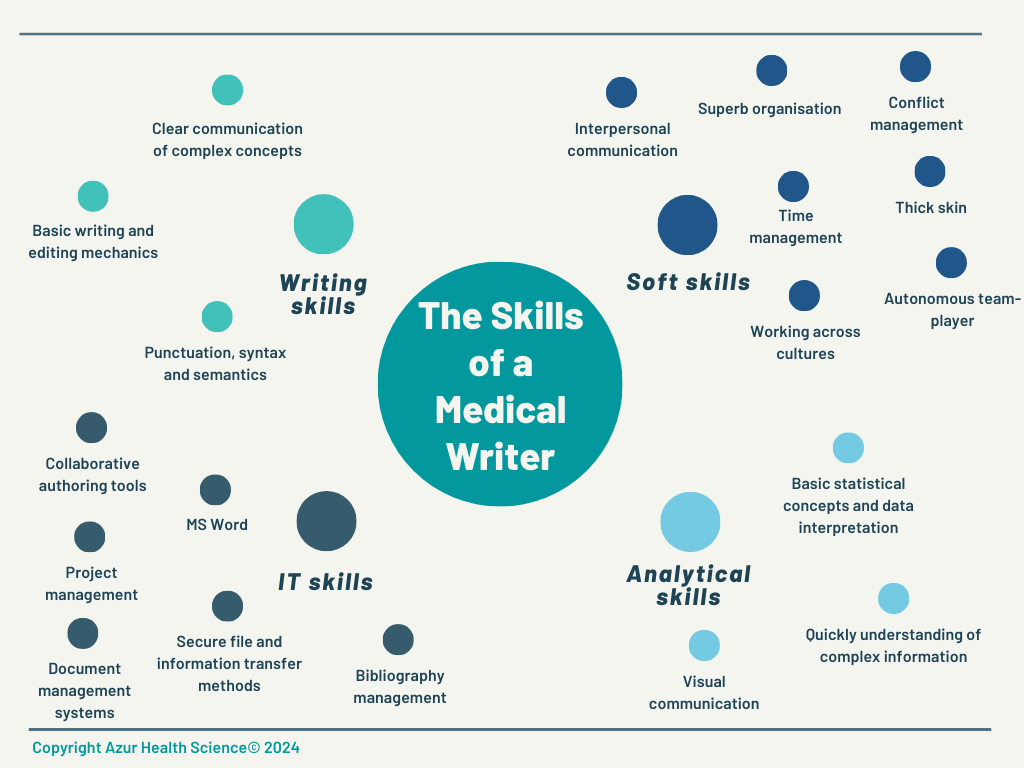
What is medical writing really like?
There is much more to medical writing than writing!
We interviewed one of our medical writers, Natalie, to give us an insight into the profession, hear how she got into medical writing and what a typical day as a medical writer looks like.
Could you tell us a little about yourself and your background? How did you get into the medical writing field?
I am from the UK, now live in France, and hold a master’s degree in medical biochemistry. During my studies I did a year-long internship in a research and development lab at GSK which I loved. As a result, I knew that I wanted to work in drug development in some shape or form in the future.
I moved to France after completing my master’s degree. First things first, I needed to be able to do more than ask for a baguette! I spent a year taking language classes and researching possible career options, a daunting task in a foreign country! I decided to complete a professional training course in clinical research, and I got my first job as a Clinical Research Associate (CRA). This is a diverse and interesting role, I was responsible for setting-up, coordinating, and supervising clinical trials on behalf of the Sponsor. I worked as a CRA for 5 years before wanting a change from what is quite a stressful job with long hours and lots (3/4 days a week kind of lots) of travel.
After applying for several entry level medical writing jobs, I was hired by Azur Health Science who were looking for junior medical writers. I’ve been working at Azur for 2 years now and I am so far very happy with my career change!
Was it an easy journey or a challenge for you to become a medical writer? Did you need a doctorate?
It wasn’t an easy journey getting into medical writing, but my job search was relatively short before I was hired as an associate medical writer at Azur. I feel very lucky to have been searching for a job at the right time!
The main challenge was finding job openings for junior writers, they were few and far between. I found myself in the infinite loop of experience – job descriptions requiring multiple years of writing experience, but few are willing to hire junior writers to get you that experience.
I didn’t come from a typical academic background with scientific writing experience, and I don’t have a doctorate, so I was concerned that companies wouldn’t be willing to give me that first chance to get my foot in the door.
However, writing skills are far from the only skills needed to be a successful medical writer. My experience in the clinical research field was crucial to getting my first medical writing job. Fresh out of university with my master’s degree in hand, it may have been more difficult.
My advice to budding medical writers would be to gain any relevant experience you can, be that attending EMWA (European Medical Writer’s Association) workshops, webinars, or doing something different to show your interest in the field. Medical writers need to be strong communicators to interact with clients daily, lead comment resolution meetings, and manage writing projects, so don’t neglect these skills on your CV and in interviews.
What are the skill-sets you think a medical writer must have?
There is much more to medical writing than sitting at our desks and writing for 7 hours a day! I have been asked more than once if medical writing is a boring job because of the common idea that we sit alone at our computer and write all day. Of course, there is a lot of that, but there is also a lot of variety in the tasks we do. We spend a great deal of time communicating with teams, conducting meetings with sometimes up to 20 people at a time to discuss review comments, sending emails to chase up information, troubleshooting formatting issues, with chats with colleagues in between.
The post featured image outlines the key skills of a medical writer nicely, and shows the wide range of skills a medical writer needs to have.
For me, the skills that have helped me to grow into the role are communication skills to form effective relationships with clients and conduct comment resolution meetings, time management skills, and, especially as a new writer starting out, a thick skin to handle the comments that each document will get without taking it personally! The ability to adapt to different types of documents, and different client IT systems is also essential.
Did you have a mentor or a role model?
Part of the onboarding at Azur included putting us through the Azur Health Science (previously Sarah Tilly Mentoring) Mentoring programme, which involves several training exercises to simulate real medical writing projects. This really helped to get me up to speed with how to manage a writing project, how to conduct comments resolution meetings (CRMs) effectively, and how to use Microsoft Word to produce quality documents. I had close support from both Sarah and Adrian during my first projects, which was invaluable. We are a small team at Azur Health Science, and the people-focused company culture means that we feel free to ask any of our colleagues for help at any time.
Can you tell us more?
This is just an excerpt of our interview with Natalie.
If you want to read the full article, sign up to the free course that we have on our mentoring site: Bridge the Gap into Medical Writing.

